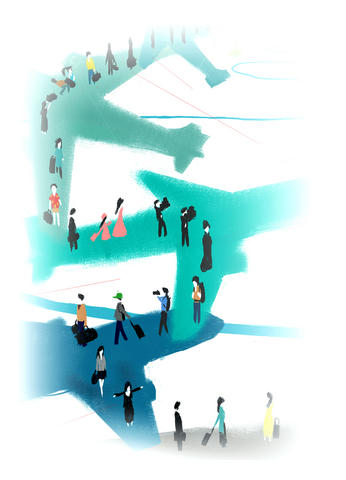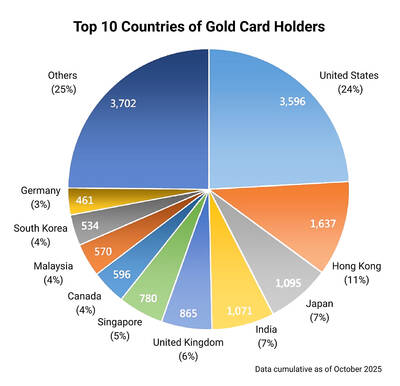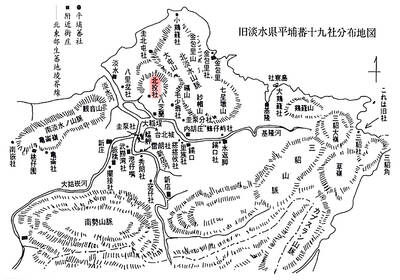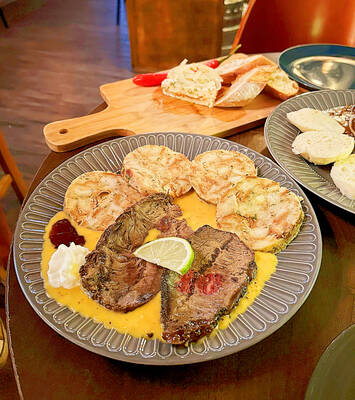A trip around the world is no easy feat. Neither is booking the ticket.
One approach is to string together a chain of one-way flights yourself. But that can quickly turn into a logistical nightmare. Instead, travelers are finding it much easier these days to book a round-the-world ticket offered through an airline alliance like oneworld, SkyTeam or Star Alliance, which have been expanding their options with new routes and partners.
In 2004, the SkyTeam alliance consisted of nine airlines, including Continental, Delta and Northwest, and served 658 destinations in more than 130 countries. Today it has 11 members and three associate members (Air Europa, Copa Airlines and Kenya Airways) and covers 841 destinations in 162 countries. In the past year alone, oneworld has expanded its network by almost 100 destinations to nearly 700, served by more than 9,000 flights a day.

ILLUSTRATION: NY TIMES NEWS SERVICE
Airline alliances are also a good option if you want to rack up frequent flier miles while circumnavigating the globe, since you typically earn miles for each leg. Choosing one depends on which part of the world you want to explore.
The largest, Star Alliance, has 19 member carriers including United and US Airways, that serve 897 destinations in 160 countries. And since Air New Zealand is part of its network, it offers particularly good coverage of New Zealand and the South Pacific. Oneworld is a good choice for exploring South America and Australia, since its 10-member network includes LAN Airlines and Qantas Airways, in addition to American Airlines and British Airways.
And all three alliances now have a means for travelers to jet around China and parts of Asia. Oneworld just added China's Dragonair, an affiliate of Cathay Pacific, to its roster, connecting customers to various destinations in China, including Beijing and Shanghai, through Hong Kong. Star Alliance recently added Air China, with a hub in Beijing, and Shanghai Airlines to its network. And SkyTeam has China Southern Airlines, based at Guangzhou's Baiyun International Airport, as a member.
In general, the alliances allow three to 15 stops for round-the-world trips, require the entire trip to last at least 10 days and insist that you travel in one continuous direction without backtracking continents. Ticket prices vary depending on the number of stops, original departure city and time of year. SkyTeam, for example, offers four distance-based prices. The shortest, 41,845km, costs US$3,085, in coach. This option is only available for those beginning their trips outside the US. The longest, 62,764km, goes for US$5,511 in coach and US$10,558 in business. Oneworld's Explorer ticket is based on the number of continents you visit (three to six), and starts at US$3,900 in coach.
But there are caveats to using alliances to loop around the globe. The biggest drawback is that you're limited to flights within the network. This may mean flying longer, inconvenient routes just to stay in network. For example, oneworld carriers do not fly direct between Johannesburg and Singapore, requiring travelers to stop in Hong Kong or another airport hub. Another caveat: If you plan to drive for part of your trip, or perhaps cross the Sahara on a camel, it will count against the distance limit (usually capped at about 64,000km).
Travelers who don't want their flights restricted to one network should consider companies like Airtreks (www.airtreks.com) and Air Brokers International (www.airbrokers.com). They tend to offer cheaper round-the-world fares than the airline alliances, in part because they negotiate discounts directly with various airlines. But you won't be able to consolidate your airline miles, and making connections might not be as smooth as through the alliances, which often group members near each other at airports to minimize connection times.
Some travelers turn to such agencies out of desperation. Last summer, Amanda Pressner, 29, a nutrition editor at a fitness magazine in New York City, and two of her girlfriends ditched their media jobs and set off on their own yearlong, 56,300km journey around the globe, which they, of course, blogged about at www.lostgirlsworld.blogspot.com. But two months into the jaunt, while touring South America, they realized that flying ticket-to-ticket created more frustration than it was worth. Some airline Web sites, for instance, wouldn't accept foreign credit cards and didn't provide customer service numbers.
So after making their way on their own to Nairobi, they turned to Airtreks, a travel agency based in San Francisco that specializes in round-the-world itineraries, and booked tickets from there to Sydney for US$2,300 each that took them to seven cities in Asia, New Zealand and Australia.
In addition, they were assigned an individual travel consultant who offered time- and money-saving tips. Instead of backtracking over land to fly out of the same city in New Zealand, for instance, when they had other cities in New Zealand on their list to see, they flew into Auckland, made their way down to Christchurch and flew out of that city.
"It would have ended up costing us money to get back to Auckland," said Pressner. The agent also informed them that in order to get in and out of New Zealand easily they needed visas for their next stop - Australia - saving them the hassle at immigration.
Whether you decide to use an alliance or an agency to get you across the globe, try starting your trip in Europe. Pressner learned that "because Europeans and Brits book more round-the-world tickets, they're actually cheaper to do from Europe," she said. "If you can get a budget flight to London and start your trip there, you can save money." Trailfinders, based in London, (www.trailfinders.com) was recently advertising a round-the-world ticket from London with stops in Los Angeles, Auckland and Hong Kong, flying on Virgin Atlantic Airways and Air New Zealand, from US$1,870.
It's also possible to book an open ticket, which lets you schedule flights as you go, instead of locking yourself into set dates. But with planes packed so full these days, last-minute seats may not be available. And if you're trying to see the world in three weeks or less, "travel westward," said Eimerd Evertsen, owner and president of Air Brokers International, based in San Francisco. "In general, it's easier on the body to travel with the rotation of the Earth."

Seven hundred job applications. One interview. Marco Mascaro arrived in Taiwan last year with a PhD in engineering physics and years of experience at a European research center. He thought his Gold Card would guarantee him a foothold in Taiwan’s job market. “It’s marketed as if Taiwan really needs you,” the 33-year-old Italian says. “The reality is that companies here don’t really need us.” The Employment Gold Card was designed to fix Taiwan’s labor shortage by offering foreign professionals a combined resident visa and open work permit valid for three years. But for many, like Mascaro, the welcome mat ends at the door. A

The Western media once again enthusiastically forwarded Beijing’s talking points on Japanese Prime Minister Sanae Takaichi’s comment two weeks ago that an attack by the People’s Republic of China (PRC) on Taiwan was an existential threat to Japan and would trigger Japanese military intervention in defense of Taiwan. The predictable reach for clickbait meant that a string of teachable moments was lost, “like tears in the rain.” Again. The Economist led the way, assigning the blame to the victim. “Takaichi Sanae was bound to rile China sooner rather than later,” the magazine asserted. It then explained: “Japan’s new prime minister is

NOV. 24 to NOV. 30 It wasn’t famine, disaster or war that drove the people of Soansai to flee their homeland, but a blanket-stealing demon. At least that’s how Poan Yu-pie (潘有秘), a resident of the Indigenous settlement of Kipatauw in what is today Taipei’s Beitou District (北投), told it to Japanese anthropologist Kanori Ino in 1897. Unable to sleep out of fear, the villagers built a raft large enough to fit everyone and set sail. They drifted for days before arriving at what is now Shenao Port (深奧) on Taiwan’s north coast,

Divadlo feels like your warm neighborhood slice of home — even if you’ve only ever spent a few days in Prague, like myself. A projector is screening retro animations by Czech director Karel Zeman, the shelves are lined with books and vinyl, and the owner will sit with you to share stories over a glass of pear brandy. The food is also fantastic, not just a new cultural experience but filled with nostalgia, recipes from home and laden with soul-warming carbs, perfect as the weather turns chilly. A Prague native, Kaio Picha has been in Taipei for 13 years and